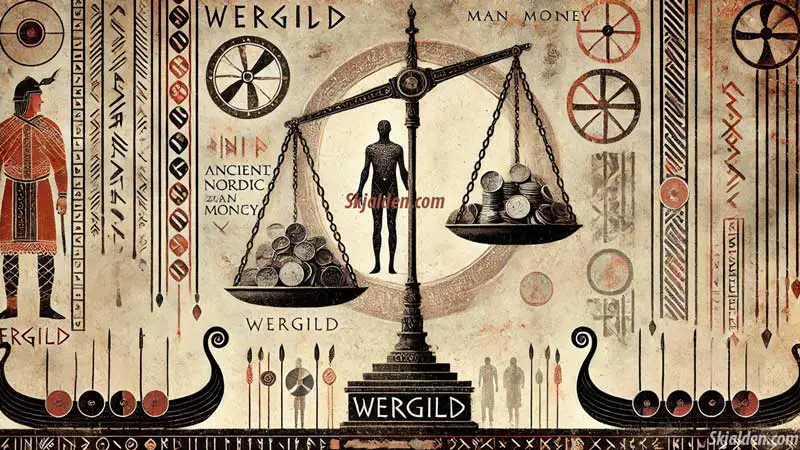Wergild, often referred to as “man price” or blood money, was an important element of ancient Nordic and wider Germanic legal systems. This compensation system involved assigning a monetary value to every person’s life, which was to be paid by the perpetrator to the family of a person who was injured or killed. This system aimed to prevent ongoing feuds by providing a structured, financial resolution to acts of violence.
The term combines Old Norse and Proto-Germanic elements, where wira signifies “man” and geld-a denotes “compensation” or “payment,” underlining its function as restitution for loss of life or injury. In the North Germanic regions, this concept was typically referred to as mangæld, underscoring its pervasive role across diverse Germanic cultures.
Nordic Application of Wergild
In Nordic societies, the amount of wergild required depended significantly on the victim’s social status. The structured social hierarchy of these communities meant that the death of a noble would incur a much higher wergild than that of a commoner. This reflects the societal value placed on individuals based on their status and role within the community.
Historically, the Old Norse law texts, like the Grágás of Iceland, detailed these amounts, ensuring everyone knew the cost of human life within their legal system. The wergild for women in these regions could also be quite high, often equaling or exceeding that of men, which illustrates the recognition of their integral role in society.
Social and Legal Impact of Wergild in the North
Wergild functioned as more than just compensation; it was a fundamental mechanism for maintaining social stability and preventing cycles of revenge that could lead to widespread violence. By replacing blood vengeance with a compensatory payment, wergild facilitated reconciliation and allowed both parties to move forward.
Moreover, significant portions of the wergild payments were often due to the king or local chieftains, who lost a member of their community or fighting force. This not only reinforced the social order but also tied the community together under the rule of their leaders, integrating the concept of legal restitution with the governance structures of the time.
Decline of Wergild in Nordic Tradition
With the spread of Christianity and the influence of Roman law during the medieval period, the practice of wergild began to wane. The Christian church’s push towards capital punishment and other corporal penalties gradually replaced financial compensation. By the 12th century, the formal use of wergild as a legal practice had largely disappeared within the Nordic regions, reflecting a significant transformation in legal and moral values.
Despite its decline, the concept of wergild has left a significant imprint on modern legal systems, particularly in the areas of civil litigation involving wrongful death and personal injury. Modern legal principles that quantify damages in monetary terms for loss of life or injury can trace their roots back to the wergild system, highlighting its long-lasting influence on law and society.
